This is a brand new writers camp in town and I’m really excited to be working on plot with a bunch of avid young writers in Portland. There are just a few slots left!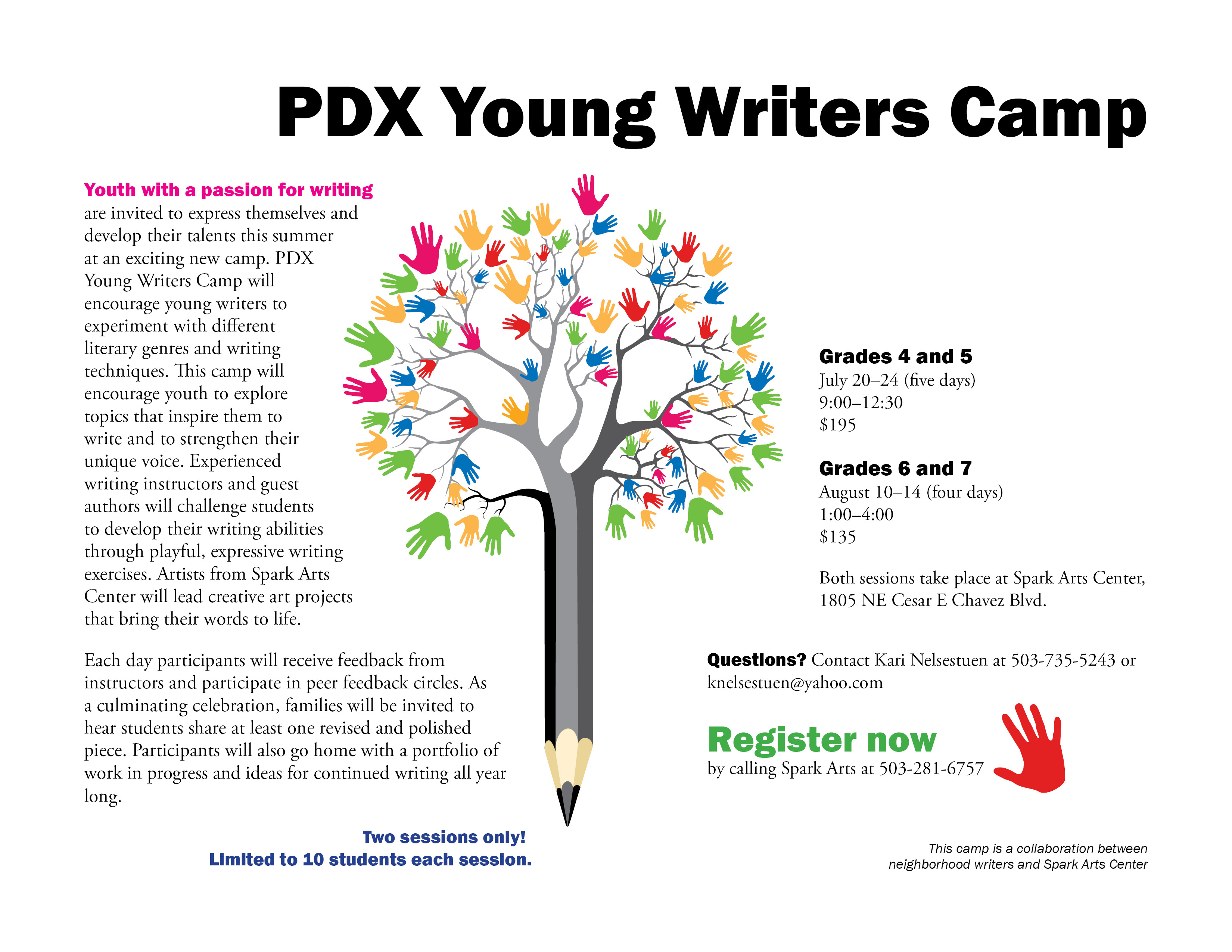
Category Archives: writing
Middle Grade Monday book review: ECHO by Pam Muñoz Ryan
Ordinarily I just take the jpeg of a book cover from the internet, but for this one I just had to take a picture of the book with my Hohner vest pocket harmonica. It’s smaller than the instruments referred to in the story, and I haven’t played it in ages, but it reminded me how much I loved having music in my pocket as a child. Echo is hard story to sum up briefly but it’s got the best flap copy I’ve read in a while so here’s that.
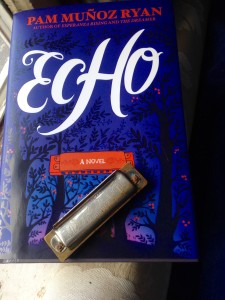 Lost and alone in a forbidden forest, Otto meets three mysterious sisters and suddenly finds himself entwined in a puzzling quest involving a prophecy, a promise, and a harmonica. Decades later, Friedrich in Germany, Mike in Pennsylvania, and Ivy in California each, in turn, become interwoven when the very same harmonica lands in their lives. All the children face daunting challenges: rescuing a father, protecting a brother, holding a family together. And ultimately, pulled by the invisible thread of destiny, their suspenseful solo stories converge in an orchestral crescendo.
Lost and alone in a forbidden forest, Otto meets three mysterious sisters and suddenly finds himself entwined in a puzzling quest involving a prophecy, a promise, and a harmonica. Decades later, Friedrich in Germany, Mike in Pennsylvania, and Ivy in California each, in turn, become interwoven when the very same harmonica lands in their lives. All the children face daunting challenges: rescuing a father, protecting a brother, holding a family together. And ultimately, pulled by the invisible thread of destiny, their suspenseful solo stories converge in an orchestral crescendo.
Richly imagined and masterfully crafted, ECHO pushes the boundaries of genre and form, and shows us what is possible in how we tell stories. The result is an impassioned, uplifting, and virtuosic tour de force that will resound in your heart long after the last note has been struck
3 things for a young reader to love
1. This is a really intriguing mix of realistic historical and fantastical elements. There’s lots to learn about the history of the 20th century here but wrapped as it is in a mythic prophesy, it doesn’t feel “teachy” yet it brings to light some really interesting and dark and difficult aspects of American and German history.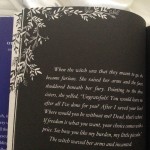
2.There is some truly beautiful book craftsmanship here: decorated pages, a lovely cover under the dust jacket, and three songs with harmonica notation in case you want to learn the music from each section of the book.
3. It’s long! I know some people are going to look at that as a disadvantage in the supposedly attention deficit MG market, but I disagree. MG readers have time to read. Some of them love long books, love the seriousness they imply, love getting wrapped up in a tale that carries them along for hours and hours. And yet there’s nothing here 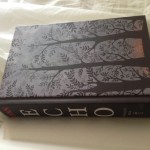 to edge it up to YA. This is the perfect book for that tender-hearted teenaged reader who is not interested in sexual relationships and blatant violence. It’s also great for that really young high level reader who needs a challenge and a story with substance but isn’t up for YA content.
to edge it up to YA. This is the perfect book for that tender-hearted teenaged reader who is not interested in sexual relationships and blatant violence. It’s also great for that really young high level reader who needs a challenge and a story with substance but isn’t up for YA content.
4. Okay I cheated 4 things. It’s diverse, seamlessly interweaving Jewish, Irish, Japanese and Hispanic experiences.
Something for the writer to think about
Prologues and epilogues are routinely discouraged by writing instructors and there are good reasons to be cautious about including one. But here’s an example of one that has been done beautifully. It’s a bold choice to mix the fantastical elements of the prologue and epilog with straight up historical fiction in the other three sections. I think it works brilliantly here making it a true bridge to the more complex and layered stories they will read as adults. And the book has something lovely to say about the nearly magical power of music to give the musician comfort and courage. I’m not a big believer in predictions, but here is a book that’s going to be on lots of best book of the year lists.
Minding the Details
I recently finished the final proofreading for my upcoming novel The Turn of the Tide. I’m really grateful that I get such detail-oriented editors and copy editors. They’ve been terrific to work with. We had a really interesting conversation about italics for foreign language words, and I learned a lot about page design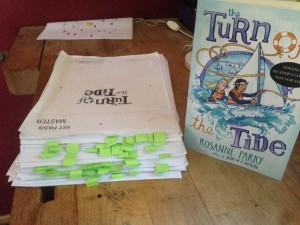 .
.
Here’s the part that astonished me though. Even after I’ve worked on a book for years, even after it’s been copy edited, I still found more than 40 errors to correct, a few were printing errors but most were my own mistakes. It’s humbling. I’m grateful that those people who receive Advanced Review Copies understand that about the process and don’t discount it in their reviews.
Summer Plans
Looking forward to warmer days and working in my treehouse this summer. I’ll be taking a workshop at Fishtrap again this summer. Last year I worked with Gary Ferguson, the author of The Carry Home, about w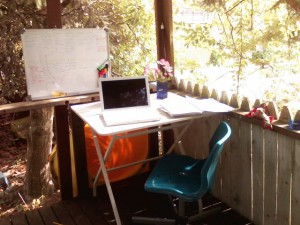 riting nature based non-fiction. It was a really refreshing break in my routine to spend some time thinking about what makes non-fiction work. This year I’m going to take a workshop from Erika Wurth and I’m looking forward to working on a group of adult short stories I’ve been fiddling around with over the last year or so. Fishtrap is held in one of the most beautiful spots on earth, Wallowa Lake, and it’s staffed but the least stuffy literary crowd you’ve ever met. I’ve grown as a writer and felt more connected to writers in my region every time I’ve
riting nature based non-fiction. It was a really refreshing break in my routine to spend some time thinking about what makes non-fiction work. This year I’m going to take a workshop from Erika Wurth and I’m looking forward to working on a group of adult short stories I’ve been fiddling around with over the last year or so. Fishtrap is held in one of the most beautiful spots on earth, Wallowa Lake, and it’s staffed but the least stuffy literary crowd you’ve ever met. I’ve grown as a writer and felt more connected to writers in my region every time I’ve  gone. If you’re looking for something different in a summer workshop, Fishtrap is still taking applications. They’ve got great stuff for young writers too so if you’re not the only writer in the family this makes a great family vacation.
gone. If you’re looking for something different in a summer workshop, Fishtrap is still taking applications. They’ve got great stuff for young writers too so if you’re not the only writer in the family this makes a great family vacation.
 I’m also looking forward to doing a little teaching in Portland at a brand new young writers workshop headed up by Kari Nelsestuen, a passionate advocate for young writers. I’ll be guest teaching a session for both the younger and older students. It’s called PDX Young Writers Camp and I’d love to send you to the website to sign up but I believe it’s already full. If you have a young writer who’d be interested in future writers camps send me note via the contact button here and I’ll get you on Kari Nelsestuen’s email list for next summer.
I’m also looking forward to doing a little teaching in Portland at a brand new young writers workshop headed up by Kari Nelsestuen, a passionate advocate for young writers. I’ll be guest teaching a session for both the younger and older students. It’s called PDX Young Writers Camp and I’d love to send you to the website to sign up but I believe it’s already full. If you have a young writer who’d be interested in future writers camps send me note via the contact button here and I’ll get you on Kari Nelsestuen’s email list for next summer.
I’ll also be teaching two brand new interactive workshops at the Willamette Writers Conference August 7th to 9th. They are on plotting and revising novel length fiction. Participants will come away with a deeper understanding of plotting long form fiction, ideas for how to strengthen setting, theme and voice, and an interactive outline for their own work in progress.  Willamette Writers always puts on a terrific conference with lots of options no matter what kind of writer you are, and they always bring in a huge range of producers, agents, and editors to take pitches.
Willamette Writers always puts on a terrific conference with lots of options no matter what kind of writer you are, and they always bring in a huge range of producers, agents, and editors to take pitches.
My personal goal is to finish up the Heart of a Shepherd screenplay in May so that I’ll have all summer to delve into new work. My book that’s coming out in January is one I’ve been work on bit by bit for more than 4 years. It actually morphed into two completely different books, so it’s been a very long time since I’ve started brand new work.
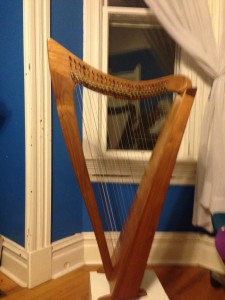 But now I’m debating between a story about a young Irish harper and the famine era migration of unaccompanied children from Ireland, and a story told from the point of a view of a wolf but also about migration.
But now I’m debating between a story about a young Irish harper and the famine era migration of unaccompanied children from Ireland, and a story told from the point of a view of a wolf but also about migration.
I’d love to hear your thoughts about which story sounds like more fun. How do you make up your mind about which story to write next?
Podcasts: the everyman’s MFA
Many of my writing friends have graduated from MFA programs. A handful of them now teach in MFA programs around the country. I confess I have long envied their wealth of resources and regular connection to high quality lectures on all the topics that fascinate me. Alas, there are several other people in my family who need undergraduate degrees before I could consider continuing my own education. So how to grow as an artist? How to keep fresh in my reading and challenge my assumptions about craft? I have gone to many a writers’ conference over the years and found them invaluable. But at this point in my career, three books in print, one being printed currently, and more than a dozen completed manuscripts, I’m looking for maximum substance and minimal disturbance to my writing routine.
Enter the pod cast.  I’ve discovered to my delight a number of podcasts that offer regular discussion of all things writerly. I like to listen to them when I’ve got a long solo road trip or when I’m cooking dinner. I’m going to list three of my favorites in the hopes that you will help me find more.
I’ve discovered to my delight a number of podcasts that offer regular discussion of all things writerly. I like to listen to them when I’ve got a long solo road trip or when I’m cooking dinner. I’m going to list three of my favorites in the hopes that you will help me find more.
 The first podcast I became aware of is The Narrative Breakdown by Cheryl Klein and James Monohan. It is a blog focused on the craft of story making through the lens of fiction editor Cheryl Klein and script and screewriter James Monohan. They really go in depth on topics from scene construction to character development to the power of irony. You can find their website here or subscribe to them through iTunes.
The first podcast I became aware of is The Narrative Breakdown by Cheryl Klein and James Monohan. It is a blog focused on the craft of story making through the lens of fiction editor Cheryl Klein and script and screewriter James Monohan. They really go in depth on topics from scene construction to character development to the power of irony. You can find their website here or subscribe to them through iTunes.
I have more recently found the New Yorker: Fiction which is a simple concept that is packed with good insights for the serious writer.  I should say at the outset that my godparents got me a book of O. Henry’s short stories for my 10th birthday and I’ve been a fan of short stories ever since. This podcast is hosted by the editor of the New Yorker. She invites a different New Yorker story writer to choose a story from the archive and read it aloud. Then they discuss what makes the story special. Though none of the stories in the New Yorker are for children, I’ve learned a lot and broadened my scope considerably.
I should say at the outset that my godparents got me a book of O. Henry’s short stories for my 10th birthday and I’ve been a fan of short stories ever since. This podcast is hosted by the editor of the New Yorker. She invites a different New Yorker story writer to choose a story from the archive and read it aloud. Then they discuss what makes the story special. Though none of the stories in the New Yorker are for children, I’ve learned a lot and broadened my scope considerably.
 The third podcast I listen to regularly is more of a fan thing. I’ve been a reader of Sherman Alexie’s work for decades before he wrote for children. He’s a very engaging speaker and I’ve heard him in person a dozen times at least so when I heard he has a podcast, I subscribed immediately. The podcast is called A Tiny Sense of Accomplishment and it’s an ongoing conversation with fellow writer and small town Washington boy Jess Walters. The conversations they have range widely but are fascinating and revolve around all the various aspects of the writers life with the occasional foray into basketball and middle aged angst.
The third podcast I listen to regularly is more of a fan thing. I’ve been a reader of Sherman Alexie’s work for decades before he wrote for children. He’s a very engaging speaker and I’ve heard him in person a dozen times at least so when I heard he has a podcast, I subscribed immediately. The podcast is called A Tiny Sense of Accomplishment and it’s an ongoing conversation with fellow writer and small town Washington boy Jess Walters. The conversations they have range widely but are fascinating and revolve around all the various aspects of the writers life with the occasional foray into basketball and middle aged angst.
I would love to hear about your favorite podcasts in the comments.
